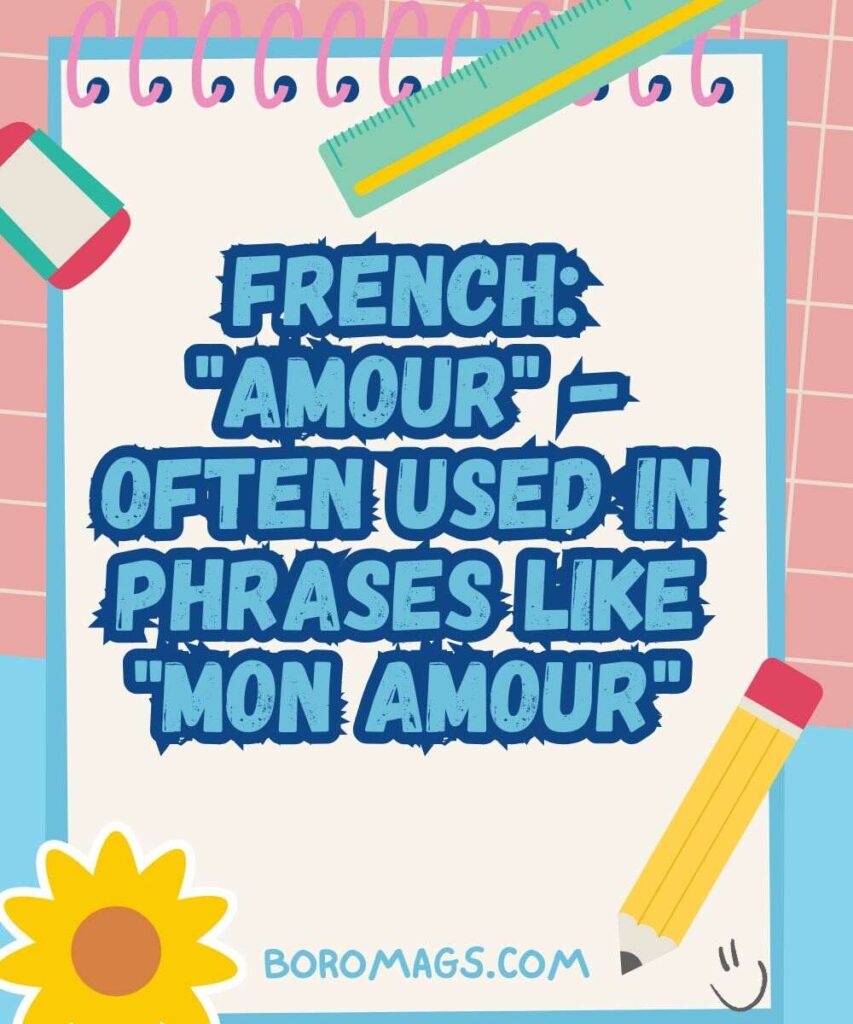The beautiful phrase “mi amor” has become increasingly woven into American culture, crossing language barriers to express deep affection and warmth.
Whether you’ve heard it in popular music, movies, or from Spanish-speaking friends, understanding this powerful term of endearment can enrich your cultural awareness and emotional expression.
What Does Mi Amor Mean?
At its core, “mi amor” directly translates to “my love” in English. However, its meaning extends far beyond this simple translation. In Spanish-speaking cultures, this term of endearment serves as a versatile expression of affection that can convey various levels of emotional intimacy.
The phrase combines two elements:
- Mi: Meaning “my” in English
- Amor: Meaning “love” in English
This heartfelt expression carries different connotations depending on the context and relationship between speakers. Unlike some English terms of endearment that might feel casual or lightweight, “mi amor” often carries a depth of feeling that makes it particularly meaningful in both intimate and familial relationships.
The beauty of this phrase lies in its versatility. In Spanish-speaking cultures, it can express everything from the deepest romantic love to gentle familial affection, making it one of the most frequently used and cherished terms of endearment in the Spanish language.
More Post: WTV Word Meaning, Uses, and Examples
The Origin of Mi Amor

The linguistic journey of “mi amor” is fascinating, tracing back to Latin roots where “amor” emerged as a foundational word expressing love and deep affection.
As Latin evolved into various Romance languages, this word maintained its core meaning while developing unique cultural contexts in different regions:
The evolution in Romance Languages:
- French: “Amour” – Often used in phrases like “mon amour“
- Italian: “Amore” – Commonly heard as “amore mio“
- Portuguese: “Amor” – Similar usage to Spanish “mi amor“
- Spanish: “Amor” – The foundation of our phrase “mi amor“
This shared linguistic heritage demonstrates how the concept of love transcends cultural and national boundaries. Each language has developed its own nuanced uses of the term, but all retain the core meaning of deep affection and care.
More Post: GTS Word Meaning: Definition, Uses & Examples
The Cultural Significance in Modern Times
In contemporary society, “mi amor” has taken on additional layers of meaning. The phrase represents more than just affection; it embodies the warmth and expressiveness characteristic of Latin culture. It’s frequently used in:
Social Settings: Social gatherings where it creates an atmosphere of warmth and inclusion Family celebrations where it strengthens bonds between generations Casual encounters between close friends expressing care and affection
Media and Entertainment: Popular music, especially in Latin pop and crossover hits Television shows and movies depicting Latin culture Social media communications and digital messaging
Cross-Cultural Communication: Bilingual communities where it serves as a bridge between cultures International relationships where it expresses universal feelings Professional settings with appropriate cultural context
How to Use Mi Amor in a Sentence
Romantic Contexts
When used between couples, “mi amor” conveys deep romantic affection. Common expressions include:
“Buenos días, mi amor” (Good morning, my love) “Te extraño, mi amor” (I miss you, my love) “Te amo, mi amor” (I love you, my love)
Family Expressions
Parents and children often use this term to express familial love. It’s common to hear:
“Cómo te fue en la escuela, mi amor?” (How was school, my love?) “Duerme bien, mi amor” (Sleep well, my love)
Everyday Greetings and Casual Use
Among close friends and family, “mi amor” can be used in casual settings:
“Pasa, mi amor” (Come in, my love) “Qué necesitas, mi amor?” (What do you need, my love?)
Alternative Terms of Endearment
Spanish offers a rich vocabulary of affectionate expressions. Here’s an expanded look at alternatives to “mi amor“:
| Term | Literal Translation | Emotional Meaning | Common Usage |
| Mi Vida | My Life | Expresses vital importance | Very close relationships |
| Mi Corazón | My Heart | Deep emotional connection | Romantic partners |
| Tesoro | Treasure | Precious one | Family members |
| Cariño | Affection/Darling | Gentle care | General endearment |
| Querido/a | Dear One | Formal affection | Respectful love |
Understanding Cultural Nuances
The use of “mi amor” requires cultural awareness and sensitivity. Consider these important aspects:
Regional Variations: Caribbean Spanish speakers often use it more freely Some regions reserve it for very intimate relationships Urban versus rural usage patterns may differ
Generational Differences: Younger generations might use it more casually Older generations often maintain more traditional usage Modern social media has influenced its application
Social and Professional Boundaries
Understanding appropriate boundaries for using “mi amor” is crucial for respectful communication. The phrase carries different weight in various settings:
Professional Environment: Generally avoided in business settings unless in very specific cultural contexts May be acceptable in informal businesses with strong cultural ties Best reserved for personal relationships outside work
Social Settings: Perfectly acceptable at family gatherings and celebrations Appropriate among close friends in casual situations Often used during festive occasions and celebrations
Common Mistakes and How to Avoid Them
When using “mi amor,” being aware of potential pitfalls can help avoid uncomfortable situations:
Pronunciation Essentials: The correct stress falls on the second syllable of “amor” The ‘r’ should be slightly rolled, but not exaggerated The ‘i’ in “mi” should be pronounced like “me” in English
Context Misunderstandings: Using it too quickly in new relationships Assuming it’s appropriate in all Spanish-speaking cultures Misinterpreting its level of intimacy
Modern Evolution in Digital Communication
The digital age has transformed how “mi amor” is used in contemporary communication:
Social Media Impact: Frequently appears in comments and direct messages Often abbreviated in text messages as “mi ♥️” or “m.a.” Used in multilingual social media content
Dating Apps and Online Relationships: Common in cross-cultural dating scenarios Used to express interest while maintaining cultural authenticity Helps bridge language barriers in international connections
Cultural Integration in American Society
The adoption of “mi amor” in American culture represents a broader trend of cultural fusion:
Entertainment Industry: Featured prominently in mainstream music Appears in popular television shows and movies Used in advertising targeting diverse audiences
Educational Value: Teaches cultural sensitivity Promotes language learning Encourages cross-cultural understanding
The Universal Language of Affection
“Mi amor” demonstrates how terms of endearment can transcend cultural boundaries:
Emotional Expression: Bridges gaps between different cultures Creates connections despite language barriers Expresses universal human emotions
Cultural Exchange: Promotes understanding between communities Enriches linguistic diversity Strengthens multicultural relationships
Looking to the Future
The continued evolution of “mi amor” in global culture suggests:
Growing Acceptance: Increasing use in multicultural settings Adaptation to new forms of communication Integration into diverse social contexts
Cultural Preservation: Maintaining authentic usage while embracing new contexts Respecting traditional meanings Balancing innovation with cultural heritage
FAQ’s About Mi Amor
What is mi amor for a girl?
“Mi amor” remains the same for both males and females in Spanish. The phrase doesn’t change based on gender because “amor” is a masculine noun. You can say “mi amor” to anyone regardless of their gender. It simply means “my love” and is used equally for all genders.
Can I call my boyfriend mi amor?
Yes, you can absolutely call your boyfriend “mi amor.” It’s a very common and affectionate way to address a romantic partner in Spanish-speaking cultures. It’s equivalent to calling someone “my love” or “sweetheart” in English and is perfectly appropriate for romantic relationships.
Can a girl say mi amor to a guy?
Yes, a girl can definitely say “mi amor” to a guy. The phrase is gender-neutral and can be used by anyone to address anyone else. It’s commonly used by women to address their male partners, family members, or close friends, just as men use it for women.
Can I call a girl amor?
Yes, you can call a girl “amor” or “mi amor.” Both versions are appropriate and commonly used. While “amor” alone means “love,” adding “mi” (my) makes it more personal and intimate. Just remember that using these terms should match the level of your relationship and the cultural context.
Final Thoughts: Embracing Cultural Expression
Understanding and appropriately using “mi amor” represents more than just learning a phrase – it’s about embracing cultural diversity and human connection. This beautiful expression continues to:
Build Bridges: Between different cultures and communities Across generational divides Among diverse social groups
Preserve Tradition: Maintaining cultural authenticity Honoring linguistic heritage Celebrating emotional expression
Whether you’re learning Spanish, building cross-cultural relationships, or simply appreciating linguistic diversity, “mi amor” offers a beautiful way to express affection and create meaningful connections. Its enduring popularity and evolving usage demonstrate how language can adapt while maintaining its essential meaning and cultural significance.
Visit For More Blogs: https://boromags.com/

Passionate about grammar, language devices, and writing tips, I help writers improve their skills. At boromags.com, I share insights on plural nouns, sentence structure, and clarity. My goal is to make writing easy, engaging, and error-free for everyone.







